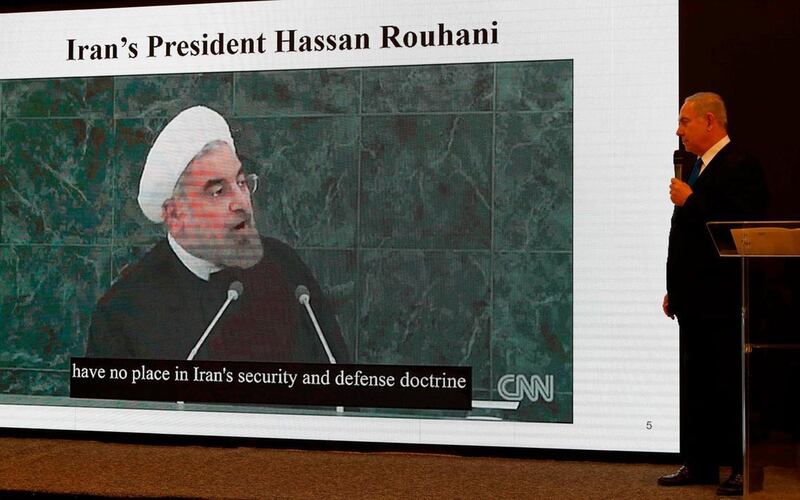Benjamin Netanyahu, the prime minister of Israel, is a notoriously dubious figure. Currently under investigation for corruption, he is a man fighting for his political life. Given these facts, it would be perfectly reasonable to view with scepticism his theatrics on Monday in Tel Aviv, where he unveiled a dossier of more than 100,000 documents, secured by Israel's intelligence agency Mossad and allegedly detailing Iran's secret nuclear programme. The spectacle evoked his 2012 UN speech, when he brandished a cartoonish diagram of a bomb. But to let Mr Netanyahu's character eclipse the contents of his big reveal would be to miss the forest for the trees. Both Israel and Iran have appalling records when it comes to honouring the dignity of those over whom they have authority; both have a history of underhand tactics; and both harbour imperial fantasies while routinely violating the sovereignty, security and rights of others.
The conduct of one, however, doesn't nullify the potential risk posed by the other. Iran's nuclear programme is an existential threat to this region. Although documents put on display yesterday in Tel Aviv pre-date the 2015 nuclear deal, they contain the claim that Tehran continued to pursue a nuclear weapons programme long after it promised to desist in 2003. In the run-up to the nuclear deal three years ago, Tehran insisted that its nuclear infrastructure existed for purely domestic purposes. The acceptance of this claim by the International Atomic Energy Agency became a condition of the nuclear deal.
There is much that remains unclear about the Iranian regime's true intentions in stockpiling enriched uranium. For the White House though, there is no confusion: Iran had a robust, clandestine nuclear weapons programme that it tried and failed to hide from the world. For a US president who was already teetering on the brink of pulling out of the deal, in the face of EU pleas to preserve it, this could be the ultimate spur to push Donald Trump to insist on a more stringent deal, if he agrees to one at all. With a decision pending less than a fortnight away and coming on the heels of new Secretary of State Mike Pompeo's visit to Israel, the timing of Mr Netanyahu's televised spectacle was no coincidence and appears to have fulfilled its purpose. The Iranian Foreign Ministry's response – to brand Mr Netanyahu a "bankrupt and scandalous liar" – is most likely to fall on deaf ears.
What is imperative is that any deal that is certified on May 12 must include the most stringent conditions, checks and balances to ensure Tehran never has the capability of building a nuclear weapon. The 2015 deal did not go far enough in curbing its powers and the sunset clause left no room for long-term accountability. Regular inspections and full transparency are imperative for the deal to survive. That is a tall order for a regime for whom opaqueness and underhand tactics are the default mechanisms by which it operates, but nothing less than that will suffice.





